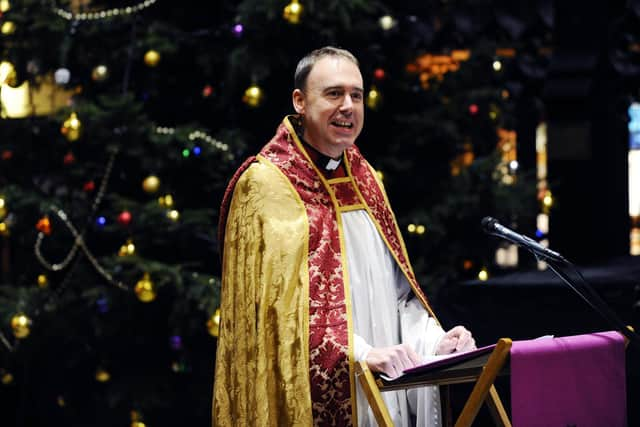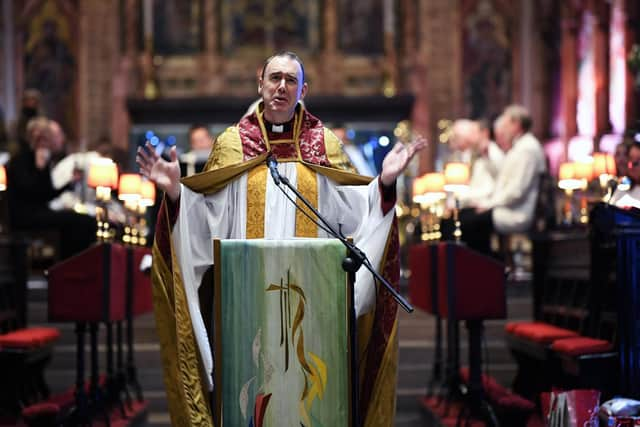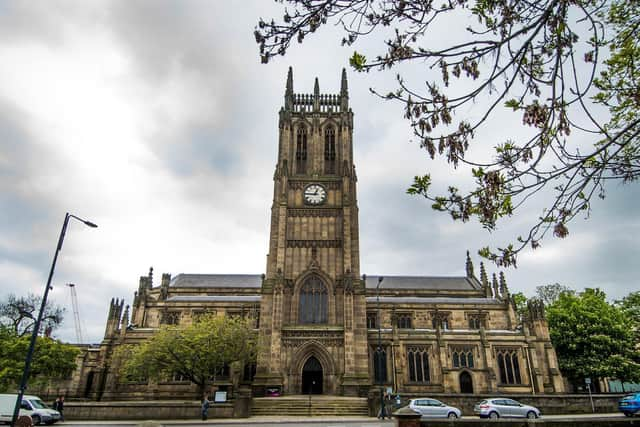Why faith has always come second as Christianity in Leeds changes with the times
and live on Freeview channel 276
As we move towards Christmas and the pinnacle of the religious calendar for the Church of England, for the latest instalment of the Yorkshire Evening Post’s Faith in Leeds series, Emma Ryan looks at what Christianity has meant to the people of Leeds.
It is the world’s biggest religion, with in the region of 2.4bn followers. It is the city of Leeds’s largest religion with 419,000 people listing themselves as Christian during the 2011 census.
Advertisement
Hide AdAdvertisement
Hide AdHowever, in Leeds that following is not as ‘traditional’ as other cities and towns and stems, says the current Rector of Leeds, Rev Canon Sam Corley, from the multi-cultural population that the city embraces.


He says: “Leeds has a fascinating history and has been diverse right from the start. In the past, people came to Leeds to make money. There was never one trade led by a handful of individuals, it was more diverse a demographic.
“Faith has always had to find its way in that mixture rather than be the thing that defined it.”
Purpose built
In comparison, Rev Corley refers to Saltaire, a model Victorian village between Leeds and Bradford. It was built by Sir Titus Salt along with a textile mill. He created the community by building houses, amenities and a church, which is still today a focal point of the village and Jewish communities, he adds, are based around synagogues.


Advertisement
Hide AdAdvertisement
Hide AdYet as we meet in the grade I listed Leeds Minster building, which is adorned with exquisite stonework, glass, etchings and grand colour and design – he muses whether faith has ever been a priority in Leeds.
“Titus Salt built the whole thing and the church put it right there, but you don’t get that sense in Leeds. I wonder whether it [the church] was ever a priority that it would have been elsewhere”.
The earliest record of Christians in Leeds was possibly a small group who settled beside a major crossing point on the River Aire in the 7th or 8th century and the location of Leeds Minster itself, consecrated on September 2 1841, is also perhaps a factor in why it is physically at the ‘heart’ of the city.
He said: “We struggle with how to be a continuous presence while the city moves. This was at the centre of the city when it opened, now there is a railway viaduct between us and that.”


Religious affiliation
Advertisement
Hide AdAdvertisement
Hide AdThe theory comes as other statistics show that people increasingly feel able to admit they don’t have a religious affiliation. A total of 212,229 people in Leeds said they had no religion in the 2011 census, while more than 50,000 didn’t answer the question.
However, he says the way people view and practise Christianity is changing to fit in with modern day life.
“Christianity is about an individual’s relationship with God but how that works out and how we do that – at different times in history certain aspects of that get emphasised over the others.
“It is coming together on Sundays, for others it is their devotion at home, but we tend to hold that worshipping together.
Advertisement
Hide AdAdvertisement
Hide Ad“What I also see when I welcome people here, people have gathered here on this site for hundreds of years to make sense of themselves in a confusing and complex world. This will take them through joy and celebration (marriage/baptism) and grief and tragedy (funeral) and people come here to make sense of all of that.”
Christmas
Rev Corley, who has been in post for four years, is also expecting to see people more and more over the coming weeks in the approach to Christmas.
Culture and commercialism aside, the festival is a celebration of the birth of Jesus Christ – the incarnation of God the Son and the second person in the Trinity of Christian Theology, according to the Old Testament.
For those who follow both the strict religious message and those who don’t necessarily believe – the act of marking Christmas is just as relevant.
Advertisement
Hide AdAdvertisement
Hide AdThe Christmas story is the story of God and he explains that it connects with people and what it means to be with other people.
He explains: “We think of the Nativity being for kids and dressing them up as angels with tinsel and a tea-towel on their heads, but it is about ordinary people being part of God’s story.
“The inn-keeper is kept away from everyone else and the nearest equivalent today would be asylum seekers, a single mum on benefits, yet God places them at the heart of his story. It is an invitation to explore a story where God and ordinary people are involved.
“There are also memories of going to church with grandparents because that is what you always did. Much about life is changing but some things stay the same.”
Evolving
Advertisement
Hide AdAdvertisement
Hide AdThe need to be constant yet evolve is something the Church of England and different dioceses have to continually contend with.
In 2014, the three diocese areas of Bradford, Ripon and Leeds and West Yorkshire were dissolved and the Diocese of Leeds was created that covers West Yorkshire and parts of North Yorkshire as a response to shifting demographics.
Rev Corley said: “There was a recognition that things were changing. Centres of population and industry were moving. The church does not exist for itself, it exists to serve others and we needed to change that. That has been happening since the 19th century and we will continue to do that. People thought the Diocese change was monumental but we do that all the time. You see churches open and close but we are moving around where the population moves.”
Also moving forward, he says one of the main challenges for the Christian faith is attracting younger people and numbers.
Advertisement
Hide AdAdvertisement
Hide AdHe adds: “This role is a privilege, it is wonderful to be part of a history where worship has been offered for 1300 years. It is a massive opportunity and responsibility.
“One of the conversations I have regularly with colleagues and other clergy is around children and young people across the faiths.
“How do we help young adults find a way through the complexity of life choices and in a soundbite culture how do we get people to attend. That is a conundrum we all share.”